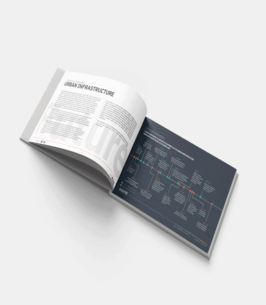Digital Transformation
The role of shared services in digital platforms
Have we set up the right shared services and internal platforms to maximize coordination and cross-leverage?
This article is part of the Digital Platforms hub
Platforms drive standardization and coordination at ecosystem-scale to organize fragmented markets and siloed supply chains. To do this effectively, platform organizations must drive standardization and coordination internally by leveraging shared services, set up as internal platforms. Shared services involve the consolidation of business operations and the cross-leverage of business assets, used across multiple organizational units.
Shared services allow standardized practices and processes to be reused across the organization, driving greater interoperability and coordination internally. This also subsequently sets the base for standardizing interfaces and interactions with external ecosystem partners and driving standards adoption across the ecosystem. Shared services drive cost advantages by reducing redundancy and increasing cross-leverage and reuse. Removing redundancy and duplication also reduces inconsistency and conflict of processes, programs and systems. Shared services also enable polling of expertise for pan-organization usage.
Shared services are critical to the scalability of a platform organization as standardized interfaces to access common services enable new innovation to be developed and deployed rapidly on top. They also enable individual innovation teams to contribute assets developed by them back to the shared services layer whenever they see the potential for cross-leveraging the assets across the organization.
Platform organizations must drive standardization and coordination internally by leveraging shared services, set up as internal platforms.
Feel Free to Share
Download
Our Digital Platforms Hub
- Leverage our extensive library of ecosystem maps created across different industries
- Identify the accelerating forces to compete in ecosystems
- Design a structured approach to winning with digital platforms
- Determine potential value pools and digital platform models in your industry
However, firms implementing shared services shouldn’t confuse and conflate shared services with a “one-size-fits- all” product approach. Shared services rely on provisioning a set of standardized modular services that may be reused as “building blocks” across diverse products.
Shared services are best implemented with a standardization and coordination mindset rather than a cost savings mindset. Cost savings are a by-product of using shared services. However, shared services are best architected with a coordination and standardization approach, ensuring that all architectural decisions made are towards driving greater internal coordination across the organization. Eventually, this also scales architecturally to support ecosystem-wide coordination, when shared services are externalized for partner consumption.
When participating in ecosystems, firms may also need to set up partnership management as a shared service. This ensures standardization of the processes and interfaces between the platform firm and its partners and prevents a fragmented and dissonant experience for the ecosystem partners. It also enables platform firms to rapidly benefit from every ecosystem relationship by reducing the time to market as additional teams within the platform organization leverage an existing relationship. Centralizing partnership management as a shared service also helps better manage the technological and reputational risks associated with partnering with ecosystem partners by standardizing on- boarding, risk assessment, and partner due diligence.
👈 Previous article related Digital Platforms Next article related to Digital Platforms👉
Frequently Asked Questions
How do platform organizations balance standardization and coordination with flexibility and innovation in shared services implementation?
Balancing the need for standardization and coordination with the imperative for flexibility and innovation in implementing shared services is a nuanced challenge for platform organizations. While standardization and coordination are essential for driving interoperability and efficiency across the organization, platform organizations must also foster a culture of innovation and adaptability to remain competitive in dynamic markets. To achieve this balance, platform organizations often employ strategies such as modularization, where shared services are provisioned as standardized building blocks that can be flexibly combined and customized to meet the specific needs of diverse products and teams. Additionally, platforms may establish governance frameworks and architectural principles that guide decision-making towards both standardization and innovation objectives, ensuring that shared services facilitate innovation while maintaining consistency and interoperability.
What challenges do platform organizations face aligning architectural decisions with coordination goals when implementing shared services?
Challenges and pitfalls that platform organizations may encounter when implementing shared services revolve around aligning architectural decisions with coordination goals while also fostering innovation. One common challenge is ensuring that shared services meet the diverse needs of different product teams and business units while maintaining consistency and interoperability. This requires robust governance mechanisms and stakeholder engagement processes to ensure that architectural decisions are aligned with organizational objectives and priorities. Additionally, platform organizations must address technical challenges such as scalability, reliability, and security when deploying shared services to support diverse products and workloads. By proactively identifying and addressing these challenges, platform organizations can mitigate risks and ensure the effective deployment and utilization of shared services.
What considerations guide platform organizations in providing shared services to partners, ensuring ecosystem coordination and customization?
When externalizing shared services for partner consumption, platform organizations must consider several key factors to ensure effective ecosystem-wide coordination and standardization. This includes designing shared services with extensibility and interoperability in mind, allowing external partners to seamlessly integrate and leverage shared services within their own systems and workflows. Additionally, platform organizations must establish clear standards and protocols for interacting with external partners, ensuring consistency and compatibility across the ecosystem. To manage potential conflicts or discrepancies between internal and external standards, platform organizations may establish governance mechanisms and collaboration frameworks that facilitate alignment and mutual understanding between internal and external stakeholders. By addressing these considerations, platform organizations can effectively leverage shared services to drive ecosystem-wide coordination and collaboration while also maximizing value for external partners.
State of the Platform Revolution
The State of the Platform Revolution report covers the key themes in the platform economy in the aftermath of the Covid-19 pandemic.
This annual report, based on Sangeet’s international best-selling book Platform Revolution, highlights the key themes shaping the future of value creation and power structures in the platform economy.
Themes covered in this report have been presented at multiple Fortune 500 board meetings, C-level conclaves, international summits, and policy roundtables.
Subscribe to Our Newsletter













